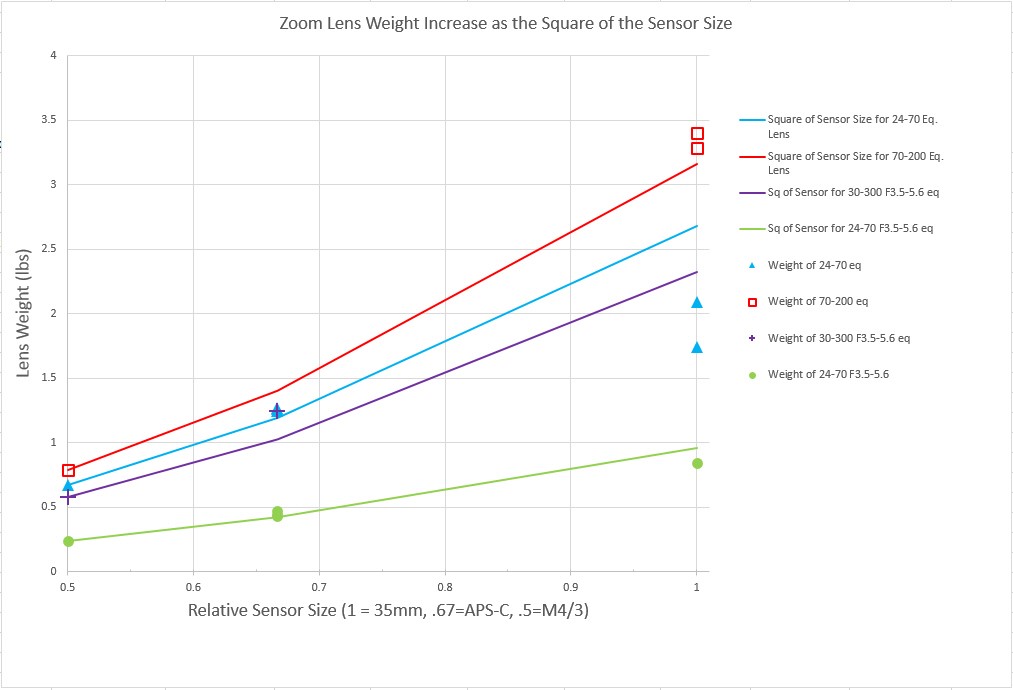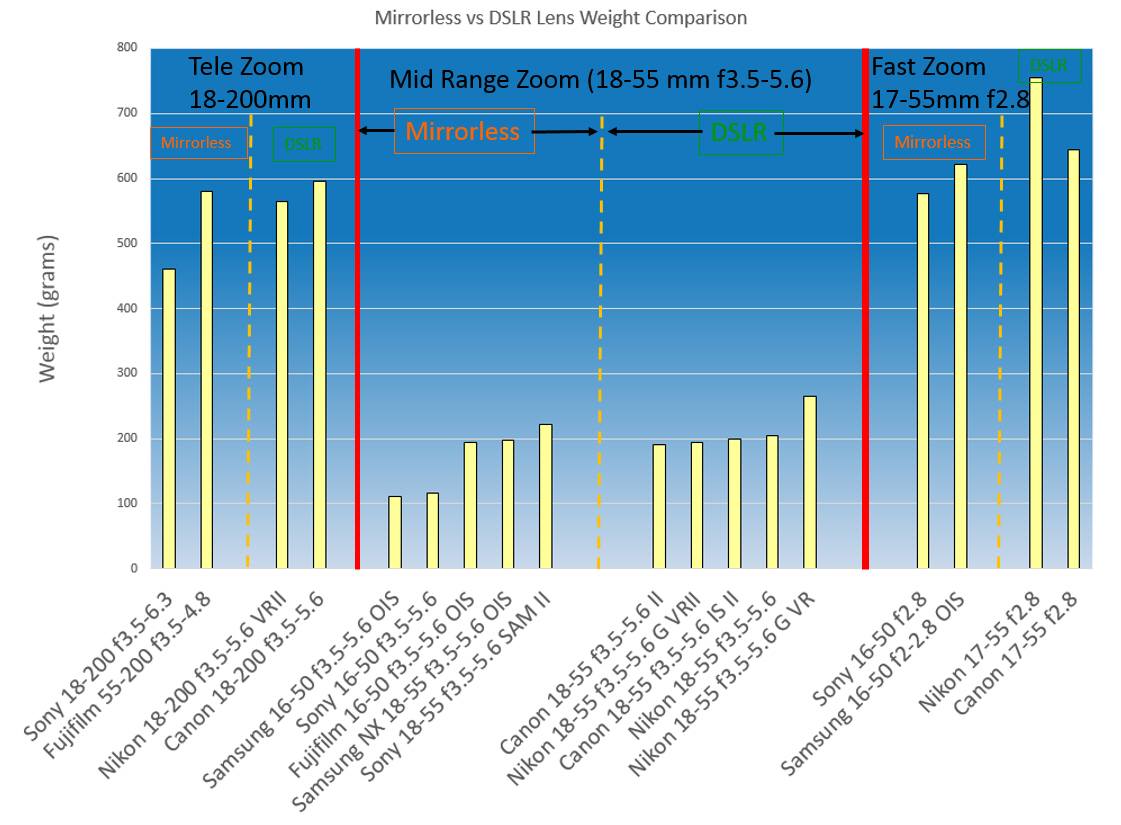
Background:
Here is a post on this topic in July 2014. Up to this point people just took by faith marketing claim that mirrorless lens are much light because they sit closer to the sensor. Nobody has challenged that claim. It was widely accepted as the truth. I decided to dig into all the lens weight to see if marketing claim was true. It was not, and the data blew that claim out of the water. It started an instant firestorm of comments. Replies ran up to the 150 limit. Majority of those members gave me "proofs" that the M4/3 sensor camera were lighter than full frame and APSC camera with lots of pictures and weights. Of course, M4/3 sensor are smaller than APSC and full frame. They were trying to confuse the issue for the typical readers.
Here is another post clearly delineating we are talking about comparison of the same sensor size cameras. Now the photography community has accepted the reality that mirrorless lens are just about the same size as DSLR. Marketing has now switched to advantage of electronic viewfinder of the mirrorless compared with optical viewfinder. They no longer talk about weight, they are very careful to only talk about size advantage. Is about 1.5"-2" thickness advantage. Mainly because the grip on a DSLR is deeper for a more comfortable hold.
From above, we know going to smaller sensor is going to cut weight with some drawback in high ISO image quality and less subject isolation with bokeh. But what about staying with the same APS-C format that DSLR use. How much weight does mirrorless save.
Sony, Samsung and Fujifilm makes APS-C Mirrorless camera. Canon and Nikon makes APS-C DSLR camera.
The versatile 18-200mm large zoom range lens, the weight difference is almost a wash for mirrorless camera.
Mid range zoom 18-55mm lens, the weight difference is also not that great. The only exception is the Sony and Fujifilm 16-50mm lens. When the focal length drops down to 16mm, the mirrorless seem to have an advantage here.
Finally, for the most expensive f2.8 large aperture mid range zoom, the mirrorless and DSLR weight just about the same. Note that the Samsung 16-50 f2-2.8 is faster than Sony, Nikon and Canon, but for these fast zoom lens, they all weight about the same. Overall, there is a slight weight advantage to mirrorless camera lens as seen below, but not a huge difference.
Therefore, if you expect to lighten the load by going mirrorless, data shows that you will likely not find much savings despite what "street advice" may say.

From the above chart, we see that there is not much difference between weight of lens for mirrorless or DSLR camera type. What about the cameras themselves. Chart below shows it all.
Comparison use all the cameras between $500-$1400. These are the typical consumer to prosumer cameras. Professional comeras are excluded because mirrorless do not have any professsional cameras that cost more than $1400 at this point. Only cameras with viewfinder are shown for comparison. Note that lower cost mirrorless without viewfinders do weight much less than these cameras. Only higher end mirrorless cameras are included here because they are the only ones that can match the autofocus performance of DSLR camera. (Mirrorless can match for single shot, but not for focus tracking)
Conclusion is the top end micro 4/3 cameras weight about the same as consumer and low end prosumer DSLR camera. With micro 4/3, camera, you may not save much, but you will save on lens weight by going to a smaller format though.
DSLR from Nikon and Canon have lighter weight lower models that cost less than $750. The higher end models that cost over $1,000 do weight more. Mirrorless APS-C format cameras do weight less than the light weight DSLR APS-C cameras, but not by too much. Average weight of DSLR cameras is 1lb. Going mirrorless will save .2lb. The heavy weight DSLR cameras are the Nikon D7100 and Canon 70D. They do weight significantly more. Average weight is 1.7lbs. Going to mirrorless will save 50% of the weight on the camera, but lens will be the same as shown above.
For full frame camera, the Sony a7 is 3/4lb less weight than the Canon 6D, so there can be some advantage there. However, if you include the heavy weight of a full frame lens, the overall weight reduction would not be as noticable. Full frame cameras are big to begin with anyway.
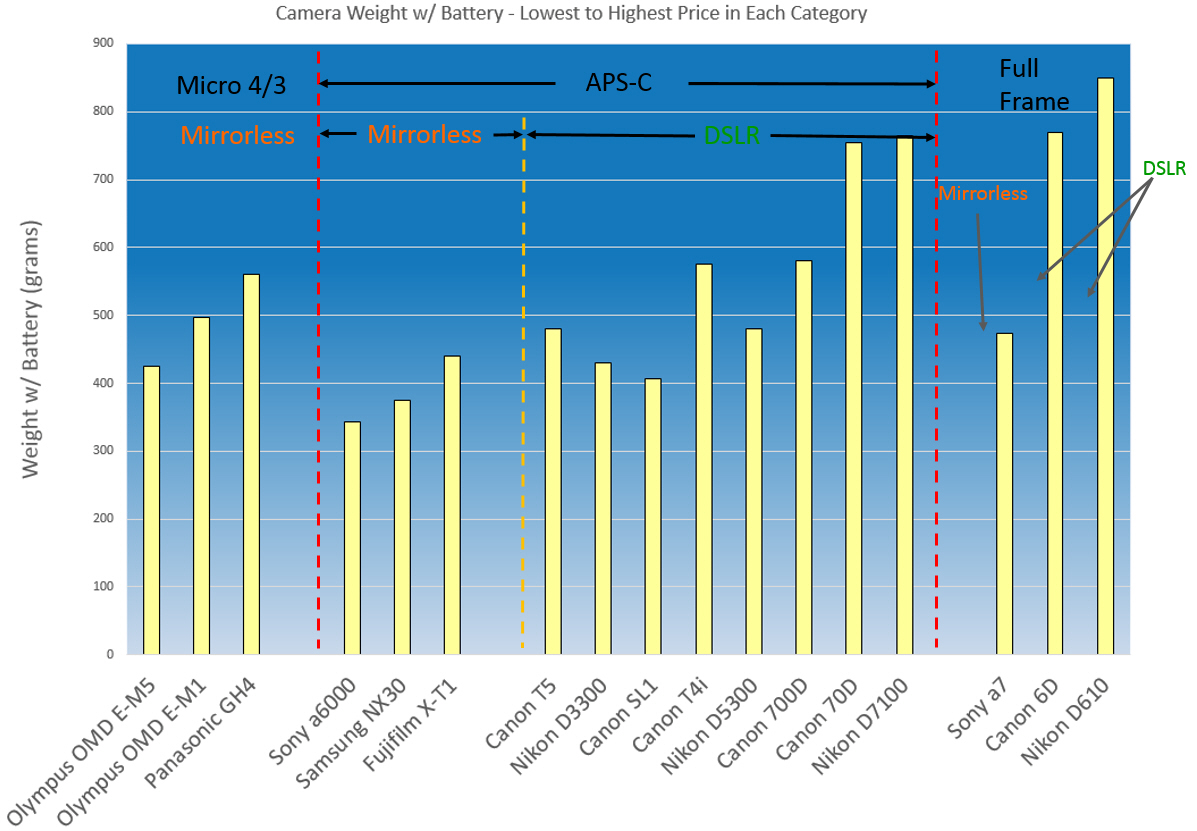
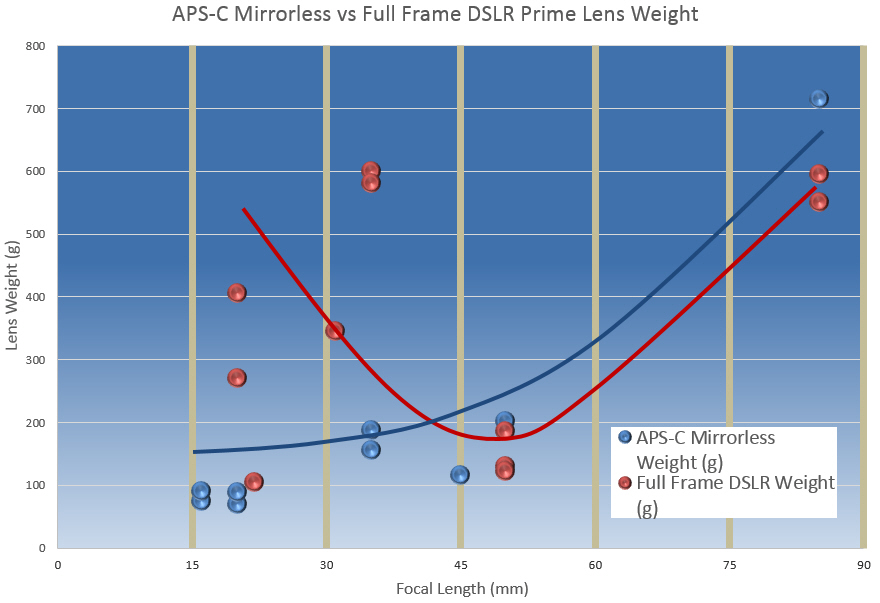
Here are the list of lens that generated the plot above.
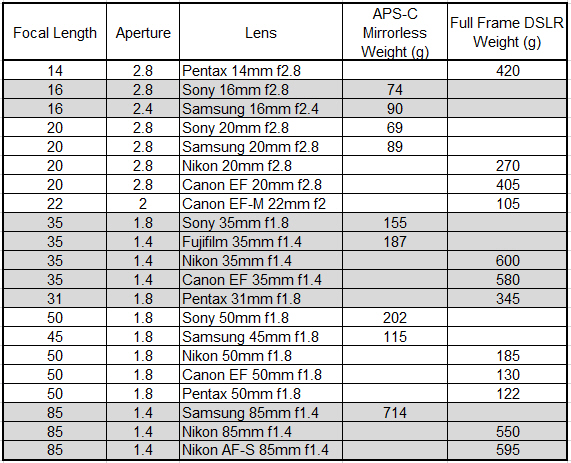
For DSLR, I used full frame lens because there are not many APS-C lens for DSLR. This means you are using the sharp center portion of the lens for better picture quality. Even with the heavier full frame prime lens, the weight compares very well with the APS-C mirrorless lens. Some DSLR prime lens are much heavier, but others are same or less.
There is not a huge weight difference between mirrorless and DSLR camera. Overall, mirrorless camera set-up weight less, but not by much. Depending on camera choice, if you choose some light DSLR cameras like Canon SL1 or Nikon D3300, and compared that with the lightest equivalent mirrorless has to offer, the Sony a6000, the weight difference is minimal. The light weight DSLR camera set-up with 18-55mm f3.5-5.6 lens would weight about 1.3 lbs., Going mirrorless with the lightest Sony a6000 and the lightest mirrorless offering in midrange zoom, the 16-50mm f3.5-5.6 lens will save a total of .3lbs camera and lens together. .3 lbs is not a very large difference. Realize mirrorless has a smaller grip that requires a finger hold instead of hand hold, and that may bother some people.
Is most likely true that someday, mirrorless will perfect the focus tracking, and have a ultra fast electronic view finder that also offer high dynamic range. We are getting close each year, but we are not there yet. Question is whether you should get a mirrorless camera now. Buying a camera is not like buying a stock in a company. Unlike stock that appreciate when the company does well, your camera becomes obsolete when the company comes out with something better. It will then loose its value. Smart money would wait until the mirrorless camera is perfected, and see where things stand before switching. While mirrorless is being perfected, the DSLR will most likely go thru changes as well. Nikon and Canon may very well start cutting weight and size from their camera. Market is starting to move from the mantra that larger and heavier is better quality to smaller and lighter with same function is better quality. Nikon Df is a case in point, is a full frame camera that weights 760g. It is lighter than the lower grade D600 full frame that came out a year before at 850g. The handwriting is on the wall for Nikon and Canon to lighten the weight of their comsumer and prosumer cameras. They seem to be going that direction. Even the D800, the revised D810 is 10g lighter. Thee will be competition between DSLR and mirrorless, and the end game is not here yet.
Electronic viewfinder lets you see exposure before taking picture. Some camera have "zebra" to indicate overexposure.
Somewhat less weight.
For video, mirrorless camera can focus way better than Nikon DSLR. Canon DSLR that has focus cell on sensor like the 70D is as fast as mirrorless though.
Has focus peaking for manual lens, but some user find them to be gimicky.
Better autofocus tracking for sports.
No delay associated with electronic view finder. Easier to time fast action at the right moment.
Optical view finder show all the details of the scene. Electronic viewfinder do not have as much dynamic range as an optical viewfinder. Dark and bright area of electronic viewfinder will washout.
Better battery life. Camera ready to shoot instantly. Some mirrorless camera
goes to standby mode, but may take some time to get out of standby depending
on models. You miss candid moments waiting for the viewfinder to power up. With
mirrorless, you also have to be obsessively charging the batteries before you
leave the house, and carry a fully charged spare. You are constantly turning
it on and off to conserve battery. Some camera will turn off the viewfinder
for you though.
DSLR in contrast, battery already last several weeks, just take the camera half
charged and shoot for the entire afternoon. These may not be dealbreakers, but
is a constant irritant that wear on you after the initial newness of the camera
wears off.
There is a strong debate going on over DSLR and Mirrorless. Claim is mirrorless lens weights less. The explanation is that mirrorless lens weight less because the lens is closer to the sensor, so designer can make a smaller lens. Let's look at the real world data to see if that theoretical talk is true.
I took some time to gather data on several popular zoom len range. They are: 24-70mm F2.8 ,70-200mm F2.8, 24-70mm F3.5-5.6 and 30-300mm F3.5-5.6. These zoom numbers are given in equivalent full frame zoom. These zoom range are popular enough that camera manufacture have them in their line up for all 3 sensors sizes (m4/3,APS, FF). Looking at their lens weight, there is a trend.
As the sensor size goes up, the weight of the lens is approximately square of the sensor size. This means to go from a M4/3 camera to a FF, sensor size as measured in diagonal corner to corner on the sensor increase by 2X, but weight of the lens increase by 4. 2 square = 4. Going from M4/3 to APS-C weight increase by 78%.
There are two conclusions here. Mirror vs mirrorless does not affect weight of the popular zoom lens. Lens weigh goes up as square of sensor size both for mirror and mirrorless. The only exception is in wide angle prime lens. Mirrorless system do tend to have very small and light wide angle prime lens.
With that in mind, picking a sensor size is just a compromise. The larger the sensor the heavier the lens. Pick the one that you are willing to carry. The way I see it, mirrorless advantage is still just a thinner camera for most people. Lens weight is irrelevant (Except if you are into wide angle prime lens).
